Senior Reflections from the Chapel
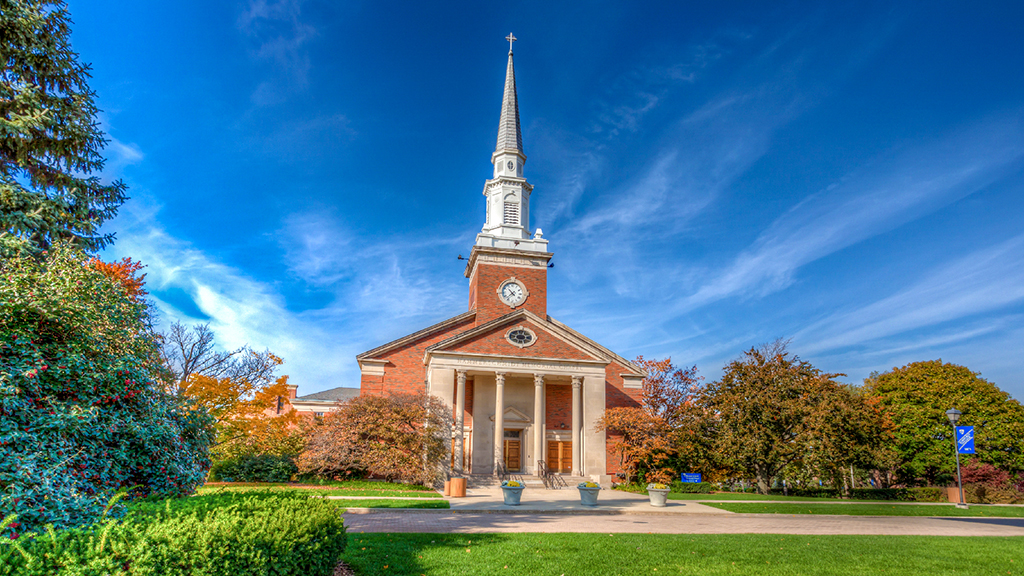
In celebration of our sesquicentennial anniversary, students from the Class of 2022 are reflecting on their time at Elmhurst.
These reflections will be released on Wednesdays at 8:00 a.m. throughout the 2021-2022 academic year.
Contributors
Senior Reflection
Scott Huston ’22
May 11, 2022
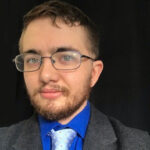 As a two-time college dropout with a learning disability, college graduation felt like an impossible goal. When I stand on the graduation stage this month, I will be standing on the shoulders of everyone who has supported and advocated for me over the years—friends, family, and faculty.
As a two-time college dropout with a learning disability, college graduation felt like an impossible goal. When I stand on the graduation stage this month, I will be standing on the shoulders of everyone who has supported and advocated for me over the years—friends, family, and faculty.
Ten years ago, a teacher saw me struggling as a transgender student and asked me how she could use her power to make the school safer for me and all those who would follow. The memory still gives me goosebumps. It was amazing to be seen, heard, and invited to speak from my experience. Five years ago, my grandmother passed away after living with my family for 20 months. Caring for her taught me innumerable invaluable lessons. In the last days of her life, steeped in grief, I admired the way that nurses guided her care to keep her comfortable, and compassionately included my family. The day my grandma died, I knew I wanted to become a nurse.
Small gestures of advocacy and kindness have left indelible marks on my life. Always try to look and listen for opportunities to use influence, regardless of your role, and you can make the world a better place for all who follow.
Scott Huston is a nursing major from River Forest, Ill.
We thank these seniors for the wonderful insights they shared throughout the academic year, and we wish them continued success!
Spring Term 2022
‘When God Became My Therapist’
 So often, we become blindsided, especially during a worldwide pandemic like COVID-19. When God became my therapist, it was unique because I automatically felt it to be more “powerful” and more “perfect” than any human’s work could do. My therapeutic relationship with God allowed me to gain this new vision.
So often, we become blindsided, especially during a worldwide pandemic like COVID-19. When God became my therapist, it was unique because I automatically felt it to be more “powerful” and more “perfect” than any human’s work could do. My therapeutic relationship with God allowed me to gain this new vision.
I have learned that sin is inevitable and is part of human nature. It simply reminds me of fast food because it could taste good in the moment, but too much of it can eventually kill you. The moment miracles started to occur around me, I started to crave the wisdoms of the world. With God’s wisdom, we start to trust in Him that he will send us the right opportunities at the right time and place.
Essentially, I started to worry less, felt more at ease, and got rid of my desire to control every aspect of my life. I felt less miserable and more hopeful that everything will work out the way it is supposed to. I pray that our generation starts to realize that mental health challenges are no joke; they are not something to be ashamed of, but rather something that no one should ever have to deal with alone. For some, it may mean working with a medical professional or a very close friend—for me, it was relying on God. The way we act, feel, and think matters. It becomes crucial that we take this into consideration as it lays the foundation for future successes. Everything truly does happen for a reason!
Jennifer Szpyt is an accounting major from Itasca, Ill.
Advice I’d Give My Younger Self
 Stress is simply a part of life, and certainly a part of school; however, sometimes stress can feel suffocating and overwhelming. Looking over my years in school, I see a lot of stress. It’s normal to be stressed, but I also possess a lot of self-doubt and the fear of messing up. I think I’m not alone with this, which can add pressure or make situations feel worse than they need to be.
Stress is simply a part of life, and certainly a part of school; however, sometimes stress can feel suffocating and overwhelming. Looking over my years in school, I see a lot of stress. It’s normal to be stressed, but I also possess a lot of self-doubt and the fear of messing up. I think I’m not alone with this, which can add pressure or make situations feel worse than they need to be.
When talking to a professor once about my fear of public speaking, she gave me great advice. She explained that in a presentation, a mess-up or a fumble in your words doesn’t ruin it. Messing up—or plans not going accordingly—aren’t the end-all-be-all. I think about this a lot now. I’ve realized that life doesn’t go according to plan and that messing up what you’re saying or planning on doing doesn’t ruin your future, your GPA, or whatever it may be. Making mistakes is normal and you can’t control every factor in what will make “success.”
This idea of plans going accordingly has contributed to increasing my stress over the years. I’m a perfectionist, and oftentimes my life doesn’t follow the path that I hoped it would. This used to intimidate me, but now I see that life won’t follow a set path no matter what you do. You cannot control every factor that affects the trajectory you take. So, remember your life follows its own path and it doesn’t need to follow a set timeline made by others or a standard guideline.
Lily Frantzis is a double major in communication sciences and disorders and Spanish from Elmhurst, Ill.
Senior Reflection
I began my college journey four years ago as a timid young student, overwhelmed by the larger world. Trying to work around this fear and anxiety, I chose my first school—Villanova University—in a small Pennsylvanian town that I was completely unfamiliar with. I was sure that if I did my best, my worries would quickly fade and I would find myself comfortable and happy there. Ultimately, quite the opposite happened, and after just one semester I decided to return home and develop a new plan, feeling defeated and disappointed in myself and the beginning of my college experience.
College is undoubtedly one of the first large changes that young adults in our society encounter. With something this massive also comes expectations. For me, these expectations were high, and involved perfection, getting this huge decision “right” on my first try, and proving to my community that I was more than capable of venturing out on my own. However, many of us—including myself, at the time—fail to recognize the façade that these expectations create, and the pressure that this puts on us to be perfect and undeterred in a time that requires adjustment and is bound to be challenging. As I encountered my own struggles at this point in my life, I felt that I was the only one unable to cope, making me a failure and an outlier in my own mind.
At this low point, though, I began to understand that the more honest that I became about my struggles and my own experiences, the more that the world reciprocated and provided me with compassion. I initially wanted to hide my “failure” from those around me, but—little by little—found that with every piece of myself and my experience that I faced and eventually embraced, those expectations rooted in falsehood crumbled. Once I began accepting and speaking about my difficulties, I learned that many others felt similarly, and that there was an entire unspoken narrative about this period of life that truly is more common than I thought. Progressively, I subscribed to this new narrative, letting go of the shame and resentment that I previously associated with myself and my college experiences.
I now enter my senior year at Elmhurst University, a proud transfer student who found her way despite some early turbulence. I am thankful for everything that I encountered up to this point, as it has only helped me to grow into myself more and embrace the uncertainty that life will continue to bring. I encourage everyone to show up as their honest selves even in times of trial, with compassion and love to share with those who are in a similar position. True belonging and acceptance will come with this, and the journey will be worth it in the end—and likely greater than you could have ever expected. I certainly found this at Elmhurst University, which I thank for their open arms to all every day.
Miranda Miscinski is a public health major from Glen Ellyn, Ill.
The Present Moment
 “Be very careful, then, how you live—not as unwise but as wise, making the most of every opportunity, because the days are evil. Therefore do not be foolish, but understand what the Lord’s will is.” — Ephesians 5:15-17
“Be very careful, then, how you live—not as unwise but as wise, making the most of every opportunity, because the days are evil. Therefore do not be foolish, but understand what the Lord’s will is.” — Ephesians 5:15-17
There is no greater overthinker than me, Randall Basilio. Coming into Elmhurst in the fall of 2018, I struggled with constantly reminiscing about the past. I was missing my friends that moved for school and I was not thrilled about the whole commuter experience. It also did not help that I became immediately stressed with striving for straight A’s, continuing my internship experience, and maintaining a social life. This was not the college experience I was so excited for. For those who know me well, I am usually always smiling and laughing. This demeanor hid my ongoing mental struggles as I ran through a strenuous routine day in and day out. I began to wonder, what if I had gone to a different school or lived on campus. Recalling the past brings good memories and multiple what-ifs, but what’s done is done.
Once senior year came around, I flipped and became so future-oriented. I began laying out a career plan of where I wanted to be in three, five, and 10 years. It’s important to have an idea of what kind of future you want to have, but I made it seem like I wasn’t going to encounter anything that will change my path. We don’t even know if we’ll wake up the next morning or how much time we’ll have left, so worrying about the past or future is foolish. I am grateful enough to have met some fascinating people in my senior year at Elmhurst who have helped change my perspective on enjoying the now. Although it took me a while to understand about living in the present, it’s better late than never.
Randall Basilio is an accounting major from Hanover Park, Ill.
Start Living
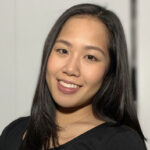 As someone who tries to balance schoolwork, work, staying active, a social life, and everything in between, you would think that I am productive all the time. Yet I am not, and I have learned to be OK with that. During my time at Elmhurst, I have consistently placed pressure on myself to always be productive. It was not until last year that I found this to be no longer sustainable for me. I realized that I deserve to have breaks. The time that I spend resting is necessary. Doing things I enjoy is necessary. Spending time with the people that make me laugh is necessary. Doing nothing is necessary.
As someone who tries to balance schoolwork, work, staying active, a social life, and everything in between, you would think that I am productive all the time. Yet I am not, and I have learned to be OK with that. During my time at Elmhurst, I have consistently placed pressure on myself to always be productive. It was not until last year that I found this to be no longer sustainable for me. I realized that I deserve to have breaks. The time that I spend resting is necessary. Doing things I enjoy is necessary. Spending time with the people that make me laugh is necessary. Doing nothing is necessary.
If there is anything you take away from my reflection, I hope you learn to take care of yourself. Take care of who you are right now, not future you. We place pressure on ourselves to do our future selves a favor and work hard now. By no means am I saying to stop striving toward your goals. What I am saying is to recognize how far you’ve come. Recognize progress. Celebrate small wins. Learn to rest and be thankful. In a world full of doing and doing, be sure you’re living.
“To live is the rarest thing in the world. Most people exist, that is all.” ― Oscar Wilde.
Regine Basilio is a double major in finance and management, with a minor in communication studies, from Hanover Park, Ill.
Becoming More Aware

Three years ago, when I first stepped on campus, I merely knew what Elmhurst University had to offer me. Reading the information on the school website, talking to current students, and attending a campus tour did not compare to the immensity of growth opportunities. My first growth experience occurred during my first school week when I encountered individuals with disabilities. My heart delighted with joy and my career interest in speech-language pathology increased. I was curious to find out more about who they were and why they were at Elmhurst University. I asked my First-Year Seminar professor, who provided me with more information about the Elmhurst Learning and Success Academy (ELSA)—my ever-widening circle began.
Today, three years later, I have been a teacher’s assistant and a life coach for individuals in the ELSA program. Our university has grown to be a hub of inclusiveness for all individuals ranging from a wide variety of abilities. Through the creation of the ELSA program, our university has designed a campus community that believes in the intellectual, personal, and professional growth of every human being. Elmhurst University is also affiliated with Pals Summer Program, which is a week-long summer camp for individuals with Down syndrome held at our campus. Our university challenges the stereotypes and defeats them by demonstrating the capability, independence, and intelligence of those who are often looked upon due to a diagnosis. I’m proud to say that I belong to a university that uplifts all individuals regardless of their background, gender or abilities.
Michelle Diaz is a communication sciences and disorders major from Joliet, Ill.
Tall Child
 “And I was so young when I behaved twenty-five, yet now I find I’ve grown into a tall child.”
“And I was so young when I behaved twenty-five, yet now I find I’ve grown into a tall child.”
Many times in my youth I had been told by the adults in my life how mature I was for my age. Teachers praised me for it, family members revered me for it, and yet now, at 21 years old, I feel as if I’m aging backward—or, better yet, trying to catch up on the childhood I had skipped on all those years ago.
Of course, I was treated to playdates and trips to the park like any other child, but I was also making calls, writing emails, and translating legal and medical jargon for my family as young as 10 years old. Some may have considered it a burden but I prided myself in the work I was doing, as I believed it to be the driving force of my character. It made me someone people could depend on, someone of value.
Yet that same characteristic of dutiful obedience I developed as a child made me somewhat anxious, afraid of letting down those around me, unable to say no to helping anyone who asked, and stretching myself as thin as possible to make sure every box was checked. I had convinced myself that as exhausted as I was, doing so would give me value, and maybe then someday I could cash in that value for my own happiness, a chance to reclaim that childhood I wished I could have reveled in more deeply.
Luckily, I have come to discover that happiness isn’t something you have to earn, there are no chips to be cashed in, no dealer to decide your fate, just you and the inner child you or others may have neglected. Take the time to get to know them, and treat them to the kindness and grace you wished you were given back then, and hopefully you will begin healing as well.
Marieli Urquiza-Trujillo is a world language education major from Hanover Park, Ill.
Senior Reflection
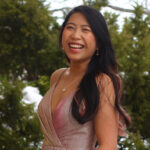 When I was in sixth grade, I remember how my class read a Scholastic Junior article about the impact immigrants have on the United States. I remember having to hear my classmates read aloud how immigrants steal American citizens’ jobs and waste national resources. I remember asking my teacher if the article was about me, because I’m an immigrant. I remember my teacher telling me, “No, it’s not about immigrants like you.”
When I was in sixth grade, I remember how my class read a Scholastic Junior article about the impact immigrants have on the United States. I remember having to hear my classmates read aloud how immigrants steal American citizens’ jobs and waste national resources. I remember asking my teacher if the article was about me, because I’m an immigrant. I remember my teacher telling me, “No, it’s not about immigrants like you.”
The nuance was that the article was truly about “Dreamers,” but there was no notable distinction made between “legal” and “illegal” immigrants. So, I got the message loud and clear.
It’s “not about immigrants like me,” but xenophobia does not truly care to differentiate between those who have undergone legal processes and those who have not. Xenophobia seeks other factors of discrimination.
Since sixth grade, I’ve been told many more times in conversations about immigrants that it’s not about immigrants like me. In some instances, this is true. In most instances, however, I realize it’s “not about immigrants like me” because I had the privilege of being able to assimilate. People can interact with me and not have to be reminded that I was born in China because I was adopted by a white family and raised in a pristine, white suburb. People forget that I’m an immigrant, and sometimes they like it that way.
In reality, xenophobia is about immigrants like me. My identity as an immigrant is not negated by how well I assimilate, and others’ identities as immigrants cannot be simplified into the ways they do or do not assimilate. So, what is an immigrant supposed to look like? If you are only afraid of the immigrants who are not like me, then what are you really afraid of? Is it really about immigration?
Jessica Goodreid is a music education major from Littleton, Colo.
Senior Reflection
 Rounding out the two-year mark since our first lockdown, it feels like our lives have become a joke—the helpless back-and-forth between stability and struggle mirrors life with chronic illness well. The need for control grows, but we never really knew what the future held, we only pretended to.
Rounding out the two-year mark since our first lockdown, it feels like our lives have become a joke—the helpless back-and-forth between stability and struggle mirrors life with chronic illness well. The need for control grows, but we never really knew what the future held, we only pretended to.
When faced with a new reality, we become resistant. We want what we cannot have. We want to revert back to a time that no longer exists.
What happens when we are faced with something that truly scares us? When we are given a life-altering diagnosis, when the world seemingly collapses, or when it actually does?
How do you deal with the fact that something absolutely abnormal is being injected into your life without your permission? No one asks for these things to happen, yet they happen anyway. How do you move forward without letting your world fall apart?
Frankly, your world does fall apart—everything inside it changes. There’s fatigue, frustration, and the overwhelming question: Why? Why is this happening?
I don’t have that answer. I had to find my own after getting diagnosed with my illness at 18, because walking around with all those questions weighed me down. This happened to me because I can handle it. Some days I don’t believe it—I have to swallow it down with my morning cup of coffee and the aftertaste is unpleasant—but it’s necessary. We are put through hard times to learn lessons we didn’t know we needed.
Olivia Janicke is an English major from Glen Ellyn, Ill.
Senior Reflection
 To the hungry soul,
To the hungry soul,
“Live your truth.” A phrase I often hear around town. This brief statement used to embody freedom and liberation for my soul. I felt eager to seize all that is mine, take on the world, and shout from the rooftops that “I belong!” But what is my truth? Who am I, really?
There are habits within me that I am not proud of, things I want to change. I am a flawed human being. The titles I have and the accolades I earn will fade. The identity I have built is shallow and short-lived. Truth must be more than this. The more I question, the less fulfilled I am by that quote.
I have no desire to live a life in which truth is piled into an echo chamber of aimless individualism and contradiction. I have no desire to live a life in which the world validates my opinions and conforms to my ways. I desire something higher, something beyond myself.
What if Truth was not about you? Would you want to listen? What if Truth changed your ways? Would you stay the course? What if Truth required a sacrifice? Would you give up your political ideology, your social media appearance, your morning routine, your relationship status? As they say, “Anyone can be true to themselves, but it takes courage to be someone better than yourself.”
I pray that the Lord gives us all a burning desire for Truth, the ability to see beyond ourselves, and the courage to respond.
Godspeed,
Hannah
Hannah Bacon is a Political Science major from Cincinnati, Ohio.
Senior Reflection
 It is a common belief that science and spirituality are complete opposites, defining the world in different ways. One concrete, one abstract. One comprehensive, one undetermined.
It is a common belief that science and spirituality are complete opposites, defining the world in different ways. One concrete, one abstract. One comprehensive, one undetermined.
As an undergrad, I’ve spent countless hours learning about the intricate relationships between atoms that make up life as we know it. Even the tiniest living things can power through adverse environments, yet at the same time, cellular components must exist within a certain threshold of conditions to survive. Over the years, laws that describe these occurrences have been able to explain the world. Yet, spirituality has been used to explain what is undefined, particularly to uncover the reasons behind those occurrences. It sets a foundation for the values that guide us in the way we as people interact with the world. While science might explain “how,” spirituality serves to explain “why.”
We often fail to realize that opposing ideologies can be used to describe the same phenomenon, confusing something as how we wish it to be with how it is. In the process of trying to find the “one correct answer,” we may attempt to replace one teaching with another without realizing that both go hand in hand. Science may be able to explain the function of a network of neurons in the brain, but spirituality can express feelings of peace and contentment. Acknowledging the bridge between science and spirituality can allow us to explore perspectives and experiences that may lead to new insights, and thus, science and spirituality can be considered two sides of the same coin.
Sonali Rajput is a biochemistry major from Berkeley, Ill.
Love From Within
 These last two years of the pandemic have proven to be challenging for everyone. Many of us in some ways have especially struggled with our mental health. Anxiety, depression, and stress have all been common feelings we have dealt with. Now that Valentine’s Day is behind us, some may be feeling even more lonely than before. While it is important to love others to fulfill our lives, it needs to be emphasized that we must first love ourselves.
These last two years of the pandemic have proven to be challenging for everyone. Many of us in some ways have especially struggled with our mental health. Anxiety, depression, and stress have all been common feelings we have dealt with. Now that Valentine’s Day is behind us, some may be feeling even more lonely than before. While it is important to love others to fulfill our lives, it needs to be emphasized that we must first love ourselves.
We should focus on taking care of ourselves and accepting and loving who we are. After all, in the Bible it states, “in the image of God he created [us]” (Genesis 1:27). We are greatly loved by God despite our flaws and insecurities. No matter the feelings of doubt, loneliness, or insecurity, he cherishes us and is constantly there to rely on in times of need.
One of my favorite bands, For King and Country, wrote a song that has resonated with me and assisted in improving my own mental health and relationship with Christ. It is titled “Priceless,” and I recommend everyone to listen to it. The overarching message is that we all have worth, so much that we are considered priceless in God’s eyes. In Ephesians 3 we are reminded “to know the love of Christ that surpasses all knowledge, that you may be filled with all the fullness of God.” His love for us is so amazing, and that should encourage us every day.
I hope that from reading this reflection you will begin the journey of loving yourself more. You should be proud of all you have accomplished in life and of what you have yet to do. I suggest practicing strategies of self-care and prioritizing your own needs. Find hobbies that interest you and bring you peace and resonance. Personally, strengthening my relationship with God and surrounding myself with the right people have made all the difference in my life. Whatever you choose to do, I hope you learn to love from within because we all are, in fact, priceless.
Emily Duis is a communication sciences and disorders major from Sheldon, Ill.
The Plan
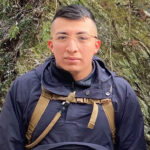 It feels as though there’s a certain expectation set forth by society from a young age. That is that we’re expected to have our entire life planned out by the time we reach adulthood. We’re expected to have a plan, one with no deviations. It can create anxiety and frustration inside of you—as it did to me at one point. Leaving high school, I enlisted in the United States Army.
It feels as though there’s a certain expectation set forth by society from a young age. That is that we’re expected to have our entire life planned out by the time we reach adulthood. We’re expected to have a plan, one with no deviations. It can create anxiety and frustration inside of you—as it did to me at one point. Leaving high school, I enlisted in the United States Army.
When I left the Army, I struggled to not compare myself with my friends who graduated at the same time I did. Most of them were graduating college, and here I was, barely about to start. I felt as though I was behind the curve.
It didn’t help that I had to take a semester off at the end of my first year in community college because I needed to take care of my mental health. I felt even further behind, but when I came back in the Spring of 2018, that’s when things took off. Having taken care of my mental health, I excelled. I joined the honors program at Harper College, and I became closer to myself and my friends and family. I eventually applied and got accepted to Elmhurst and started in January of 2020.
That first year wasn’t what I or anyone expected. Life was once again not going according to “plan.” Anxiety and fear hit me again, thinking that I was falling behind the plan again. But during that time, I found my passion for public policy. I talked to my professors and they helped guide and steer me in the right direction. Since then, I continued to excel in school and attended a law school course at UIC while still an undergrad, being a member of a national fellowship with the University of California at Berkeley.
The point of my story is that you create your own life plan. It’s important not to compare where you are in life with others because everyone moves through life at different paces. I was 24 when I even had an idea of my life plan, and it came from unforeseen circumstances. However, I recognize that things can and will change. Especially in the world we live in today, you never know what will happen. Just know that you are in charge of your life plan.
Juan Sandoval is a political science major from Chicago, Ill.
What Time is It?
 There are 24 hours in a day. Seven days in a week. Four to five weeks in a month. And 12 months in a year. This is the time cycle for our lives on Earth. Within a single day, six to nine of those hours are spent sleeping. Another seven to 10 hours are spent working or at school. Another few of those hours are whisked away driving, or taking care of family, or doing extra work and school assignments. After ALL those necessities, what time do we have left? Even with all our differences, we all have the same daily struggle: time.
There are 24 hours in a day. Seven days in a week. Four to five weeks in a month. And 12 months in a year. This is the time cycle for our lives on Earth. Within a single day, six to nine of those hours are spent sleeping. Another seven to 10 hours are spent working or at school. Another few of those hours are whisked away driving, or taking care of family, or doing extra work and school assignments. After ALL those necessities, what time do we have left? Even with all our differences, we all have the same daily struggle: time.
Let me tell you about a person that is terrible with time. This person feels constant stress and pressure to get everything done in her day. She views her life as a race against a ticking time clock that she is always losing. A task that takes someone a certain amount of time to complete takes her triple that amount. She is defined as slow and time management is not her strong suit.
Yes, you may have guessed that this person is me. It has felt like I have been in a war with time for many years, from unfinished standardized tests to simple everyday tasks that take forever. Yet, I have learned that many others have a similar complaint—that there just is not enough time in their day. Within our society, there is a deep-rooted desire to push, work, and achieve without any breaks. We want to do it all, admiring those who live in the fast lane. We never think about how important rest can be. Even God, who in six days created the heavens and the earth “rested from all his work” and “then [God] blessed the seventh day and made it holy” (Genesis 2:2-3).
We all need a rest from the crazy happenings of this world to recharge and focus on what is important. If we give everything we have to our work, we will not have anything left for the people we love and the relationships we value. If we give all our time to things of this world that will leave us empty at the end of the day, then we will never have time to listen for God’s voice. “Be still and know that I am God” (Psalm 46:10) is not only recognition of the goodness of God, but also that He is calling us each to a specific purpose if we take time to rest and listen.
When we take time to step back and look at the bigger picture of life, we begin to ask complex existential questions. Who am I? What do I want or not want to become? What will I do? What will my legacy be? How will I carry out my life’s purpose? The scary thing is that nobody knows exactly how much time they will have to live. Life’s uncertainty forces us to build a foundation of beliefs on something. Whether that is a faith in God, some other greater being, or something else entirely, we all find ways to spend life’s valuable time. “There is a time for everything, and a season for every activity under the heavens … He has made everything beautiful in its time” (Ecclesiastes 3: 1 and 11).
Kayla Mast is a psychology major from Quincy, Ill.
January Term 2022
Senior Reflection
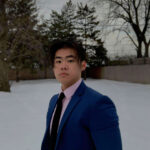 It was meant to be a regular cold early spring Tuesday last year on March 16—my alarm went off at its usual weekday time, 2:00 p.m. CST on the dot. I brushed my teeth, fed the dog, and placed offerings on my family’s Buddhist altar. All was right in my little corner of the planet. It was meant to be a regular Tuesday.
It was meant to be a regular cold early spring Tuesday last year on March 16—my alarm went off at its usual weekday time, 2:00 p.m. CST on the dot. I brushed my teeth, fed the dog, and placed offerings on my family’s Buddhist altar. All was right in my little corner of the planet. It was meant to be a regular Tuesday.
Not long after I finished my first lecture, I heard the news. In an act of brazen racism, a gunman had opened fire on three spas in Atlanta, claiming eight lives, six of which belonged to Asian women. The event sparked international outrage, becoming the catalyst for anti-Asian violence protests around the globe. The COVID-19 pandemic bared its fangs once more as anti-Asian sentiment skyrocketed worldwide, especially in the United States—an empire not particularly known for its inclusivity. Hate crimes committed against AAPI people surged 150% in 2020, and the Stop AAPI Hate organization received 3,795 reported incidents that year alone. As the son of a Chinese nail technician, I was horrified. It could have easily been Chicago instead of Atlanta. It was obvious anti-Asian sentiment had increased the past year: I’d see supposed friends “like” sinophobic content on social media, and hear snickering about the virus’ origin in the Founders Lounge. My father insisted I claim only my Vietnamese heritage instead of my Chinese origin—sad he believed it necessary to hide my identity, even sadder it wouldn’t work, as our distinctive almond eyes alone were steadily becoming sin.
With Chinese New Year on the horizon and on the cusp of the anniversary of that fateful Tuesday, I want our institution to reflect on its capacity to contribute toward lasting impacts on university grounds and beyond. As a university that has historically championed diversity and inclusion, I think it is important to reflect on steps taken already to advance change and perpetually build off that foundation. There is always more work to be done as minoritized groups will continue to have targets on their backs. Stop AAPI hate.
Alex Ho is a double major in political science and history from Melrose Park, Ill.
The Human Garden: What Seeds Will You Plant?
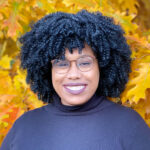 Here lies the human garden. It is filled with all that the human race has cultivated, created, and grown. It is full of beautiful, majestic greenery as well as destructive, troublesome weeds. The ideas, the actions, and the intentions we put within every idea and endeavor have created the garden we see. Right now, we are at a time of our lives where possibilities are limitless. Though we have not had much time on this earth, we have seen the products of the seed planters and have planted some seeds of our own. From the first seed planters of our kind, who dared to discover, create, and survive. Those who believed in more than what currently exists and dared to challenge what is possible. Some of these ideas were cultivated and brought to beautiful fruition, while other seeds died before they had a chance to live. Some seeds lie dormant in the ground, waiting for their time in the sun.
Here lies the human garden. It is filled with all that the human race has cultivated, created, and grown. It is full of beautiful, majestic greenery as well as destructive, troublesome weeds. The ideas, the actions, and the intentions we put within every idea and endeavor have created the garden we see. Right now, we are at a time of our lives where possibilities are limitless. Though we have not had much time on this earth, we have seen the products of the seed planters and have planted some seeds of our own. From the first seed planters of our kind, who dared to discover, create, and survive. Those who believed in more than what currently exists and dared to challenge what is possible. Some of these ideas were cultivated and brought to beautiful fruition, while other seeds died before they had a chance to live. Some seeds lie dormant in the ground, waiting for their time in the sun.
Much of the human garden makes up the composition of our lives, our living circumstances, and our possibilities. If not for the seed of equal rights planted, many of us would not be able to attend college. If not for the seed of separation from England planted, we would not have democracy in this country. Without these seeds, these thoughts and possibilities, much of what we have would not exist. If the seed of Elmhurst University was never planted, we would not be where we are today. We would not be reflecting on the sesquicentennial, and I would not be writing this message to you. But here we are, in 2021, and all of this was made possible by those who dared to dream of the nonexistent.
Think about the seeds you have planted. Yes, you are in college. Maybe you are not. Maybe you are years past it and reflecting on your college years. Did the seeds you planted give someone an opportunity? A chance? A new idea? Did your seed bloom beautifully? Did it die before it got its chance? Is it too late for your seed? What grew from your seeds? Was it a business that gives people jobs? Was it a foundation that gives to the homeless? Was it inventive? What is revolutionary? Did it solve a problem? Did it give someone peace? Security? Hope? What seeds do you want to plant? Is it a new way of thinking? Is it a chance to change? Is it a reminder? Is it good? Is it bad? Will it destroy? Will it give? All of these are questions to consider. Not all seeds are equal. Not all seeds will grow as large as the others. Some will extend beyond the clouds. Some will cover other plants, shading them from much-needed sunlight. Do you want to create something that could destroy other plants? What will the benefit be? What will it cost? How much are you willing to work to see your seed grow?
So the human garden will change. Things get better. Things become obsolete. Plants will die, and better ones will grow in their place. Like the circle of life, dying plants will nourish the seeds of newer plants. It will go as long as we go. You will finish college, you will get your degree, and after that, who knows? So … what seeds would you like to plant? Yes, you majored in business, or pre-law, or whatever else you did. The seeds you plant are not defined by the path you’ve chosen today. Life is not promised or preset, so your choices are your own. What would you like the human garden to look like? What will you do to make this happen? Seeds that you plant may not see the light of day during your existence. They may, however, be fully realized, and change the composition of the human garden forever. So, I ask again, what seeds will you plant?
Khadijah Leverette is a music theory and composition major from Lisle, Ill.
Senior Reflection
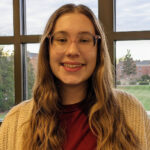 Philippians 2:3-4
Philippians 2:3-4
“Do nothing out of selfish ambition or vain conceit. Rather, in humility value others above yourselves, not looking to your own interests but each of you to the interests of the others.”
What a radical idea in today’s culture. This idea of setting others before ourselves, and even at times sacrificing something for the sake of another is not something we practice often. To lay down time, money, possessions—whatever it is in order to help those around you. There is a deep pain in our world that we could help alleviate if we didn’t live in such a self-absorbed culture. What if we spent an extra 20 minutes with a friend who was hurting? What if we set aside our feelings and what we want and rather enter into the lives of those around us? What a beautiful world it could be.
Rebekah Small is a nursing major from Hinckley, Ill.
A Letter from Your Teacher
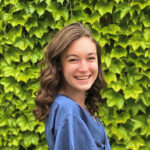 Oh, my child.
Oh, my child.
I see how you dream, how you soar, how you gleam.
How you dance and sing and everything you bring,
To this classroom, to the world, to its people.
I see a billion galaxies in your eyes
And the depths of the ocean when you cry.
I see you unearthing your heart for others
And growing consistently in your understanding of your brothers.
In this classroom, in this life, you are
Golden, shining bright.
You are chosen, you are here,
You are not lost.
When I gaze upon you, I cannot but help
My eyes fill with tears
When I listen to what you hear:
“You are wrong, you don’t matter, you’re too this or that, you’re nothing but tattered.”
“You should live my way, his way, any way but your way.”
I try my best to shield you, to yell and scream and say,
“Don’t listen!”
Oh, my child.
If I could love you hard enough to shelter you from the malice of this world,
I would.
But I can’t.
Only you can look inside those galaxy eyes
And swim in the oceans of your cries.
Only you can see your true measure,
But I promise to be here as you learn to treasure
Yourself
And others
And the goodness of the world.
For the goodness is not lost,
It is inside you,
You and your galaxy eyes.
Lainey Hewitt is a music education major and dance education minor from Arlington Heights, Ill.
Fall Term 2021
Senior Reflection
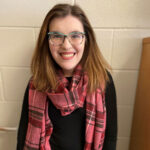 One hundred fifty years of Elmhurst University is a huge milestone. We as a community have come together through many challenges by becoming one united community. The community that we are a part of has experienced numerous different generations and continues to evolve. Hammerschmidt Memorial Chapel is a rich part of our university’s history. There have been numerous speakers who have set foot in the Chapel such as Martin Luther King Jr. He is just one of the remarkable people who have been part of the University’s history.
One hundred fifty years of Elmhurst University is a huge milestone. We as a community have come together through many challenges by becoming one united community. The community that we are a part of has experienced numerous different generations and continues to evolve. Hammerschmidt Memorial Chapel is a rich part of our university’s history. There have been numerous speakers who have set foot in the Chapel such as Martin Luther King Jr. He is just one of the remarkable people who have been part of the University’s history.
The Elmhurst community has come together on the steps of the Chapel to protest, pray, and stand together. We have stood together for Black Lives Matter. We have stood together to honor those who have lost their lives to gun violence, war, and COVID. We have lit candles to show that we are there for change and remember those who have walked the path that we have before.
We light candles together with alumni at Lessons and Carols each year. We have lighted up the Chapel with thousands of candles to celebrate the arrival of Christ. The rich traditions that are included throughout the evening show there is a community that is joined together.
The history that is a part of Hammerschmidt Memorial Chapel is a part of celebrating 150 years. For the next 150 years, there will be many more remarkable memories, and the community will continue to strive and grow.
Lorraine Schuler is a psychology major from Naperville, Ill.
A Look at Mental Health on World AIDS Day
 Mental health can affect daily encounters, relationships and physical health. Starting a conversation is important.
Mental health can affect daily encounters, relationships and physical health. Starting a conversation is important.
Reaching out is a sign of strength as we all have challenging times in our life, but it’s important for your own well-being. It is important to break down the stigma surrounding mental illness, and to remind one another that help is available. Talking about mental health openly as a community helps members learn to cope.
The pandemic has caused a lot of disruption and confusion amongst many. Some individuals have felt like their mental health has been much worse during this time. The University had to close in March 2020 and transitioned to online instruction. Students and faculty had to be flexible and patient as it was a very challenging time. Many individuals were worrying about themselves, their family, friends, peers, coworkers, etc. The constant sense of worrying led to ongoing fear which significantly impacted people’s ability to cope with everyday life. With isolating ourselves from one another, social distancing, and closure of workplaces, many individuals experienced distress and anxiety. In regards to COVID-19 and mental health, I have been beyond fortunate to know about different resources that are available to the community.
World AIDS Day
December 1 (today) marks World AIDS Day. It is important to raise awareness. As a community, we can show support for those battling against HIV and remember those who have passed from it. As a society, we need to work toward eliminating stigma against HIV. We can do this by using certain words and phrases, such as saying “person with HIV” or “person living with HIV,” instead of “AIDS patient,” for example. Using problematic phrases can make one feel powerless.
Destiny Gloms is a psychology major from Bensenville, Ill.
We Can’t Swallow The Earth
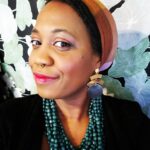 I tried burning my hair into a submission that is not inherent to its natural structure. I tried suppressing my disgust at all the non-POC that dash to the other side of the street in an effort to avoid walking past me. I tried leaning into a spiritual identity, yet religious bias and elements of the dominant culture within that group pushed me out. I tried working a door-to-door job in efforts to gain courage but had the cops called on me. I barely avoided them while hiding in my car. I tried running to class to be there promptly, only to realize a White man stopped a security guard from trying to catch me as if I stole something. I tried laughing in the public with friends and was the only person shushed for laughing too loud despite the laughing-loud group effort. I tried vacationing to Denver’s art museums and was met with being followed by security the entire duration I was there. I tried having a friendly conversation with someone new and it was assumed that in my childhood, I must have lived in an apartment with a treeless yard. I tried conducting a workshop in a primarily Black neighborhood and expected non-Blacks to show up. I tried believing that land was to be owned by humans until I realized land ownership is a colonial lie.
I tried burning my hair into a submission that is not inherent to its natural structure. I tried suppressing my disgust at all the non-POC that dash to the other side of the street in an effort to avoid walking past me. I tried leaning into a spiritual identity, yet religious bias and elements of the dominant culture within that group pushed me out. I tried working a door-to-door job in efforts to gain courage but had the cops called on me. I barely avoided them while hiding in my car. I tried running to class to be there promptly, only to realize a White man stopped a security guard from trying to catch me as if I stole something. I tried laughing in the public with friends and was the only person shushed for laughing too loud despite the laughing-loud group effort. I tried vacationing to Denver’s art museums and was met with being followed by security the entire duration I was there. I tried having a friendly conversation with someone new and it was assumed that in my childhood, I must have lived in an apartment with a treeless yard. I tried conducting a workshop in a primarily Black neighborhood and expected non-Blacks to show up. I tried believing that land was to be owned by humans until I realized land ownership is a colonial lie.
Our sociocultural systems perpetuate a long-winded ill will belief regarding the value of othered people. It made me believe that hierarchy of cultural value should stem from Eurocentrism and I. Must. Bend. To it.
I persist as me, however. Pressing gently and aggressively upon the decolonization button when possible.
I do hope, too.
I believe establishing healthy multicultural bridges is a promising journey. Although, the eventual outcome of the earth is that it will swallow us all and itself whole.
Norbaya Durr is a double major in Biology and English, with a minor in Chemistry, from Chicago, Ill.
Senior Reflection
 My time at Elmhurst University has been interesting, to say the least. In the summer between my second and third years of school, the school changed its name from Elmhurst College to Elmhurst University. During the spring semester of my second year, the entire country went into lockdown due to COVID-19. I was living on campus at the time and the music department faced a demanding obstacle—how can we make music together if we can’t be together?
My time at Elmhurst University has been interesting, to say the least. In the summer between my second and third years of school, the school changed its name from Elmhurst College to Elmhurst University. During the spring semester of my second year, the entire country went into lockdown due to COVID-19. I was living on campus at the time and the music department faced a demanding obstacle—how can we make music together if we can’t be together?
As everyone can relate, it was difficult making the drastic change to isolation. Every major on campus faced challenging obstacles. From Zoom classes, Blackboard collaboration, and gaining the skill of patience with both professors and students learning a new platform, many felt as if they were first-year teachers. As the semester progressed there were two things I was thankful for: music and the support of my professors.
Despite the fact of isolation, music never left my side. It was easy to push being a flute player aside and binge-watch a series instead. With the help of my music professors, I was able to stay engaged in music and retain a positive attitude towards playing in a different learning environment. Professors were huge advocates for our music program and many changes came as a result of COVID. A distance of six feet between instrumentalists and instrument masks and bags that distorted the sound made it difficult but somewhat normal to be playing as an ensemble after a year and a half.
With the help and support of music and professors, there was a constant reminder of my passion and love for music. One thing I am eternally grateful for.
Deisy Garcia is a music education major from Carpentersville, Ill.
The Opportunity to Succeed
 My mom is from a small coastal town near Bari, Italy and my dad is from a mountainous town near Palermo, Sicily. My grandparents decided to move their families to America to find better opportunities and they sacrificed more than I could ever imagine.
My mom is from a small coastal town near Bari, Italy and my dad is from a mountainous town near Palermo, Sicily. My grandparents decided to move their families to America to find better opportunities and they sacrificed more than I could ever imagine.
As soon as my grandparents arrived in this new country, they went to work to provide for their families while my parents stayed home with their Italian relatives where only Italian was spoken. This led to my parents being unable to speak English when starting school, and for my mom’s speech impairment to be undiagnosed her first few years in America.
Despite all of these obstacles and sacrifices my parents and grandparents faced in this new and unfamiliar country, they set the foundation for my siblings and me for generations to come. They made a life-changing decision to pick up and leave their home country where everything was familiar, to a place where they couldn’t even speak the language. Because of this move, my parents met, and gave my siblings and me so much more than what they had access to when they were children.
I can proudly say that I am a first-generation college student and am studying speech-language pathology and Spanish in hopes of helping English Language Learners like my parents, and helping people with communication disorders. Everyone has their own version and story of their American Dream, and this is mine.
Julia Pollina is a double major in Communication Sciences and Disorders and Spanish from Mount Prospect, Ill.
Senior Reflection
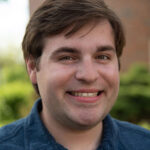 Up until March of 2020, the largest source of pride and anxiety in my life was my academic success. For nearly three years, I found myself playing a real-life video game, “beating” class after class just like they were levels of increasing difficulty. Sometimes, I benefited from my instinctive understanding of the subject matter, but at other times I hung on for dear life as I barely “beat” the class; for me, success was the difference between an A and an A-. During that time, nothing less than an A was acceptable as it would mean the demise of my “perfect” grade point average.
Up until March of 2020, the largest source of pride and anxiety in my life was my academic success. For nearly three years, I found myself playing a real-life video game, “beating” class after class just like they were levels of increasing difficulty. Sometimes, I benefited from my instinctive understanding of the subject matter, but at other times I hung on for dear life as I barely “beat” the class; for me, success was the difference between an A and an A-. During that time, nothing less than an A was acceptable as it would mean the demise of my “perfect” grade point average.
Of course, this was how I approached my undergrad education before a global pandemic caused mass isolation, economic suffering, and a health crisis my generation had never seen before. In this time of chaos and uncertainty, my priorities regarding education were abandoned as I looked for signs of hope. Thanks to the guidance of a wonderful, young Christian woman from neighboring Wheaton College, I found myself seeking out the love and comfort of Jesus Christ.
Upon finding Christ, I was soon met with His words of endearment and enlightenment. Just as He rose from the dead, He brought me up from the darkness that surrounded me and showed me what I had failed to see before. While I had ceased to worry about what grade I would receive in my classes, my struggle with what the pandemic had deprived me of remained.
The pandemic meant not being able to take walks around campus, admiring its architectural and natural beauty. The pandemic meant not being able to have engaging discussions with faculty and fellow students. The pandemic meant not being able to enjoy long bike rides along the Prairie Path on weekends. The pandemic meant not being able to share laughter, video games, and late-night pizza runs with friends. The pandemic meant not being able to see the talent of my friends in their music, theatre, and dance performances. The pandemic meant everything that really mattered at Elmhurst was lost.
The initial pain of this realization was quickly followed by the joy of finally understanding why I had come to Elmhurst. The grades were important, but it was the experience that truly mattered.
God brought me to Elmhurst so I could take part in this extraordinary experience. He knew that this experience would allow me to explore myself in ways I would not have otherwise. He knew that this would be the turning point where I would learn to serve Him through the intellectual, interpersonal, and creative gifts that he granted me with. God did not bring me to Elmhurst to achieve a particular academic score.
To all who stress about their grades: don’t. Your time at Elmhurst should be about the experiences you have, the relationships you build, and the memories you make. You will never have a set of four years like this ever again, and you will find yourself much happier and more fulfilled by prioritizing what you can measure only through qualitative means.
Matt Zoppa is a marketing and music business double major from Montgomery, Ill.
On Belief and Following Your Passion
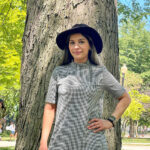 I wasn’t supposed to be here—at Elmhurst and this world. For many years, my mind had been a prison that prophesized that a future did not belong to me. Yet here I am, nominated by Dr. Mary Kay Mulvaney and the Honors Department, to contribute to Elmhurst University’s 150th.
I wasn’t supposed to be here—at Elmhurst and this world. For many years, my mind had been a prison that prophesized that a future did not belong to me. Yet here I am, nominated by Dr. Mary Kay Mulvaney and the Honors Department, to contribute to Elmhurst University’s 150th.
I want you to realize that strength is not physical. Self-doubt kills more dreams than failure ever will. Believing in predictions that don’t empower you will defeat you from fulfilling what you were meant to do, what you were born to do. Mental strength is a powerfully crucial component of health and happiness.
Incarceration of the mind is riveting. But know that you are valuable and need to liberate yourself from the self-imprisonment. The difficulty of finding liberation from negativity and hopelessness is only as grand as your perception of it. Motivate yourself! Find therapy in talking to God. God saved me from myself. He saw my potential and kept me to fulfill a purpose—whatever it is. Although I cannot foresee the future, I trust Him.
Being here was worth it, though! After Elmhurst, the International Scholar Laureate Program has invited me to join other designated individuals to fulfill a delegation on Medicine and Science in Sydney, Australia. And with the help of God and Dr. Raymond Kraus, who encouraged and aided me with research, I have found a passion in osteopathic medicine. I am no longer a slave to hopelessness, but a master of faith.
Never give up.
Take care.
Sabia “Sibi” Akhoon is an exercise science major from Glendale Heights, Ill.
The Blame Game
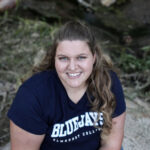 In today’s world, it’s easy to let things get to you. It may be a bad grade, a hard day, or even something someone said. Although it’s easy to let life get you down, it’s even easier to blame yourself for the things that happen around you. We all know that feeling. It may be a pit in your stomach or a feeling of guilt you can’t seem to get rid of, but we all get it.
In today’s world, it’s easy to let things get to you. It may be a bad grade, a hard day, or even something someone said. Although it’s easy to let life get you down, it’s even easier to blame yourself for the things that happen around you. We all know that feeling. It may be a pit in your stomach or a feeling of guilt you can’t seem to get rid of, but we all get it.
Blame isn’t something you can get away from, matter it is someone blaming you, you blaming someone else, or blaming yourself. We all do it; it’s okay. But to blame, it’s not a fair concept. Sure, we’ve all heard it, “life isn’t fair,” but blame isn’t about life; it’s about the “assignment of responsibility.” But it’s much more than that. Blame can tear you down. For instance, if you blame yourself for every mistake, questioning your whole life down to one decision. That’s not exactly fair, is it? One bad grade, one mistake, one fault doesn’t change the whole course of your life. Life doesn’t care about the responsibility for right and wrong; it’s life; it cares about nothing.
So how do you circumvent the blame game? Don’t. I said it, don’t blame yourself, don’t blame others. Mistakes, bad grades, and your faults aren’t the end all be all, and those things aren’t on you or on anyone else. So I challenge everyone reading this to give everyone a break and change the blame game.
Ashlee Welch is a political science major from Santee, Calif.
The Least Interesting Thing About Us
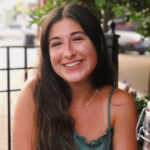 We live in a world that tells us we should be smaller. We should eat less and move more. Take up less space. Fit into the sugar-free cookie-cutter mold of the ideal body type, no matter what it takes.
We live in a world that tells us we should be smaller. We should eat less and move more. Take up less space. Fit into the sugar-free cookie-cutter mold of the ideal body type, no matter what it takes.
So I listened. After months of strenuous exercise and restrictive dieting, I did everything society demanded of me just to be worthy of others’ approval. Physically, I was inching closer to what society deemed as satisfactory. Mentally, however, was quite the opposite. I was not content when I looked in the mirror regardless of how small I got; I was even more unhappy than when I had started. The smaller I was, the more pressure I felt to shrink, even if it meant sacrificing everything that brought me joy.
Take it from someone who crashed into the fierce pressure of diet culture. Someone who said no to ice cream dates with friends or family dinners because they were more concerned about calories than they were about memories. Someone who was constantly sore because they couldn’t keep up with the vigorous stress of 2-hour workouts 7 days a week. Someone who is very much still a work in progress. Life does not magically get better when you get smaller.
A plea from the girl you said “looked great!” once she lost weight: don’t say it. While your compliment may be well-intentioned, it could be reinforcing dangerous behaviors that you cannot see on the surface. There are so many more important things to talk about than a person’s body.
Your worth is not determined by your body. Your purpose is not determined by your body. And the impact you have on the world around you is absolutely not determined by your body. Truth be told, your body is the least interesting thing about you. You are so much more than that.
If you don’t love every inch of your body from head to toe, that is okay and that is normal. But, to truly love yourself, you have to accept your body exactly how it is. You are not alone; in fact, I am right there with you.
Morgan Gerhardt is a physical education major from Naperville, Ill.
The Freedom of Forgiveness
 “Holding onto anger is like drinking poison and expecting the other person to die” —Buddha
“Holding onto anger is like drinking poison and expecting the other person to die” —Buddha
Olivia Rodrigo’s Sour has inspired a lot of thought about betrayal and the emotions it fosters. I think sadly we all have moments that we’ve been betrayed, whether it be by a friend, lover, family member, etc. If you’re anything like me, you may find yourself holding on to anger and wielding it as a weapon in defense of yourself. Almost as if being angry at the person who hurt you is your right and something that helps you regain power.
When I have been really hurt, I put an intense amount of energy into feeling angry, and some situations require that. Emotions demand to be felt. I replay scenarios in my head over and over again, as if doing so will uncover some hidden understanding of why it happened. It’s exhausting. I hope that at the end of every cry and outburst, you let go. Continue to cycle through the hurt in this way until you’re indifferent about what happened.
Breaking that cycle is a decision. I hope you come to see: people who hurt you don’t deserve energy or space in your life, so don’t give it to them. You will find people who invest in you just as much as you invest in them; those are the ones you should put your energy into finding. And know that forgetting isn’t a prerequisite to forgiving. Forgiveness is about attaining peace and moving forward.
Lauren Berryhill is a music education major from Palatine, Ill.
Career Does Not Define You
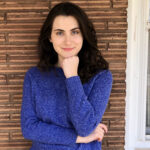 “What do you want to be when you grow up?”
“What do you want to be when you grow up?”
This is the question we are pestered by as children, and despite its sincere intentions, the problem becomes that from a young age we are conditioned to tie our core identity to a career.
In his article for The Atlantic, “Workism is Making Americans Miserable,” Derek Thomspon describes “workism” as the belief that work is not only necessary to economic production but is the centerpiece of a person’s life purpose. But isn’t workism the crux of American culture? The American dream equates labor to prosperity, so for generations people have toiled dutifully, dreaming of green lights but having to settle for crippling mortgages and mental and physical exhaustion instead. Even as students, how much of what we do, from classes to extracurriculars to travels, are shaped by our career aspirations? The question “How will this look on my resume?” lives rent-free in my head.
Naturally, this career mindset can be detrimental. According to the OECD Better Life Index, the United States ranks 29th in work-life balance, while many European nations that prioritize time off and personal wellbeing dominate this category. The implication being that a better work-life balance leads to a healthier and happier population.
Work is important, but it is not everything, and, ultimately, it is not who we are. The relationships we have, our hobbies, the books we read, the people we help are just as much a part of us as our occupation is and yet legislation and education in the U.S often express otherwise. In our hustle and grind culture, being overworked has become a badge of honor; but this lifestyle doesn’t necessarily lead to a well-rounded life. So, take care of yourself, live meaningfully, and, most importantly, don’t let capitalism get you down.
Sasha Aleksandra Graf is a digital media major from Lombard, Ill.
What it Means for Me to Be Hispanic
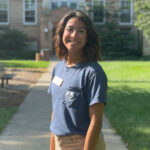
What does it mean to be Hispanic? Mexican-American to be exact. With Hispanic Heritage month happening Sept. 15–Oct. 15, I would like to shed light on this.
Being Hispanic means celebrating Noche Buena with a huge party in Mexico or in the U.S. Being Hispanic means being a personal translator for our parents. It means helping others understand their broken English and closing the language gap between professionals and English as Second Language citizens. Being Hispanic means growing up with little to no guidance on how to apply to college, scholarships, FAFSA and looking for information through others. Being Hispanic also means that we celebrate the 15th birthday of daughters entering womanhood and leaving girlhood behind with a huge party filled with family, food, and music. Being Hispanic means dancing cumbias, bachatas, banda, nortena and zapateado. Yes, this all is true but there is a different meaning to me.
Being Hispanic to ME means being the first in my family to achieve a degree in college—Biology at that. It means helping my family from the years of struggle to finally live comfortably. To me, it means having the intelligence to know two languages and to take that as an advantage. Being Hispanic means developing the perseverance that I have to combat social, economic and educational disadvantages. To me it means having a culture that I am proud about, embracing my parents’ culture as much as embracing American culture. Being Hispanic to me, means I am unique, filled with dreams and culture but also struggling with discrimination, being stereotyped, and having an educational disadvantage.
I am here today as Edith to prove to many that one can achieve their dreams no matter your income level, race, ethnicity, gender identity, etc. I always found and fought my way to get to where I am and you can, too. The world is changing and we are part of the change. Being Hispanic to me means being the positive future this world needs. Viva México y el mes de los Hispanos.
Edith Mercado is a biology major from Genoa, Ill.
On Yom Kippur, ‘The Day of Atonement’
 As a Jewish woman, I observe the holiday of Yom Kippur. Yom Kippur is considered “The Day of Atonement,” spent with hours of prayer while fasting in order to ask for atonement for your sins. These high holy days are so vital to moving forward in life, even though the day is spent looking back in our past. Yom Kippur is a time where we recognize our sins, feel regret, and then we work to resolve the harm they caused to ourselves and to others. A unique time of prayer during Yom Kippur is the Viddui service, which means confession. In these prayers, the language is all plural, meaning that no one person is a sinner, yet we all are collectively responsible for the sins of the world.
As a Jewish woman, I observe the holiday of Yom Kippur. Yom Kippur is considered “The Day of Atonement,” spent with hours of prayer while fasting in order to ask for atonement for your sins. These high holy days are so vital to moving forward in life, even though the day is spent looking back in our past. Yom Kippur is a time where we recognize our sins, feel regret, and then we work to resolve the harm they caused to ourselves and to others. A unique time of prayer during Yom Kippur is the Viddui service, which means confession. In these prayers, the language is all plural, meaning that no one person is a sinner, yet we all are collectively responsible for the sins of the world.
Attending Elmhurst University these last few years has taught me a lot about myself. I have been given the blessed opportunity to grow and flourish here on campus. However, growth comes with lots of trial and error, as well as sinful behaviors. Making mistakes is all a part of the growth process, however, forgiveness is equally as important. If God can love and forgive us for our sins, then we can forgive ourselves. I ask if all of you, regardless of your religion, will take a day to really reflect and repent for your sins, for you too, will be forgiven.
Anna Hill is a psychology major from Country Club, Mo.
It’s Never Too Late to Change for the Better
 When I look back at my time here at Elmhurst, one thing I see within myself and those around me is growth. We have all grown into new people since we were in high school and even just grown from our first semester to now.
When I look back at my time here at Elmhurst, one thing I see within myself and those around me is growth. We have all grown into new people since we were in high school and even just grown from our first semester to now.
What is beautiful about growth is that it is ever-changing and always occurring. In Judaism, we are given a time to start over spiritually, twice. Rosh Hashanah, the Jewish New Year, is one time to start fresh and hope for a “sweet new year.” It is said that God inscribes names of the righteous in the “Book of Life,” and one has from Rosh Hashanah to Yom Kippur to make teshuvah, or repentance, before the book is sealed. The Tanakh verse 7:18-19 talks about casting one’s sins into the sea and is a beautiful ceremony known as Tashlich.
You don’t need to be Jewish or perform Tashlich to have your own fresh start. You can make a change now. Reach out and make amends with that one friend or family member that you may have wronged, and never stop trying to evolve into the best person you can be going forward.
My hope for future Bluejays joining our university is that they will strive to be their best selves here at Elmhurst and continue to foster a welcoming community. As we finish today, the last day of Rosh Hashanah, what we can learn is that it is never too late to change our lives for the better.
Who is a God like You, Who forgives iniquity and passes over the transgression of the remnant of His heritage? He does not maintain His anger forever, for He desires loving-kindness. He shall return and grant us compassion; He shall hide our iniquities, and You shall cast into the depths of the sea all their sins.
—Micah 7:18-19
Brielle Imana is a psychology major from Willowbrook, Ill.
Faith In Experience
 Experiences are the best teachers. The good ones leave us with the best memories while the worst ones leave us with the best lessons. However, with faith, we can learn from and utilize them for a better future. When I was a freshman, I joined the Black Student Union (BSU) and I remember discussing with my friends that we should join the executive board the next year. The following year, we joined the board and we continued to have light-hearted conversations about one of us possibly becoming president. Continuously beginning our sentences with “If I was president, I would … ”
Experiences are the best teachers. The good ones leave us with the best memories while the worst ones leave us with the best lessons. However, with faith, we can learn from and utilize them for a better future. When I was a freshman, I joined the Black Student Union (BSU) and I remember discussing with my friends that we should join the executive board the next year. The following year, we joined the board and we continued to have light-hearted conversations about one of us possibly becoming president. Continuously beginning our sentences with “If I was president, I would … ”
I, eventually, became president. I was elected shortly after the COVID-19 pandemic had started. Thinking we’d be back to normal by the next school year, I thought of so many ideas that I was ready to implement. From new ways to engage with and involve African-American students on campus to fun, educational, and innovative ways to spread culture and pride around campus amongst POC students and allies alike. However, all those plans dissipated when the COVID-19 pandemic failed to end as quickly as we all thought it would. This situation reminded me of the film Evan Almighty. In a particular scene, “God” says “If someone prays for patience, you think God gives them patience? Or does he give them the opportunity to be patient?” So, it begs the question … if you pray for the answer to a situation, do you think God gives us the answer? Or does he provide us the opportunity to either reflect or gain experience so that we know what to do moving forward?
My plans changed. Old doors closed and new ones opened. Did I get to do everything I wanted to do? … No. But, were different avenues explored to make the most out of it? … Yes. From using new and different platforms for outreach to group online events and movies.
I have been fortunate enough to have experienced many things at this school because I have seized the opportunity when it arose. Even if the decision was difficult and the outcome wasn’t what I expected. I’ve encountered countless situations and decisions and put faith in the opportunity unbeknownst of the outcome. Hebrews 11:1 says that “faith is substance of things hoped for, the evidence of things not seen.” I can’t complain about the past four years because they’ve made me stronger. A person who perseveres by the courage of faith and experience. The future I dream for this school is that it continues to bring about change for its African American and minority students; creating individuals that persevere. Jeremiah 29:11 says, “For I know the plans I have for you, declares the LORD, plans to prosper you and not to harm you, plans to give you a hope and a future.”
By continuing to have faith in experience, I will definitely have more experiences to fill you in on soon. Until then, take care.
Raven Rhone is a biochemistry major from Austin, Texas.